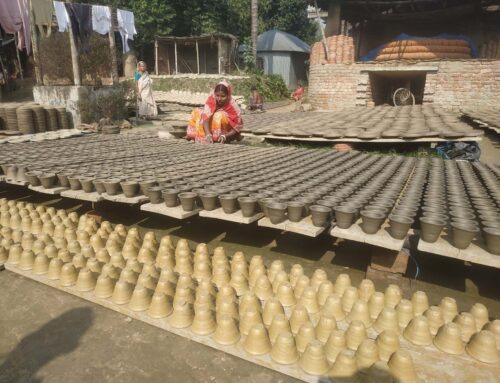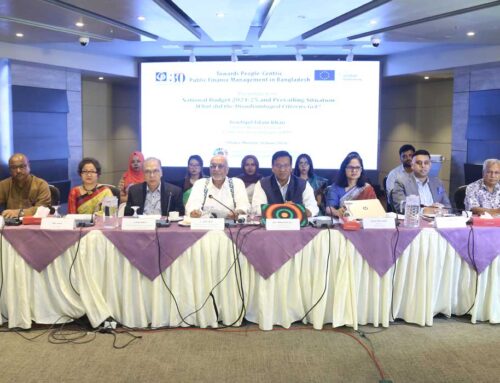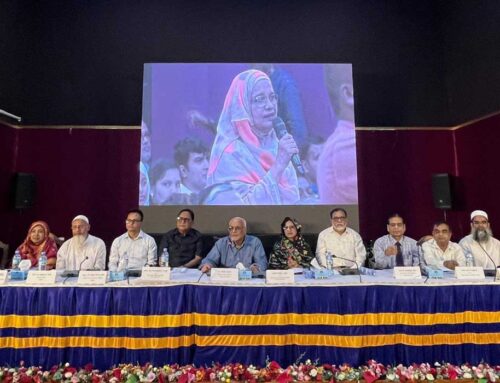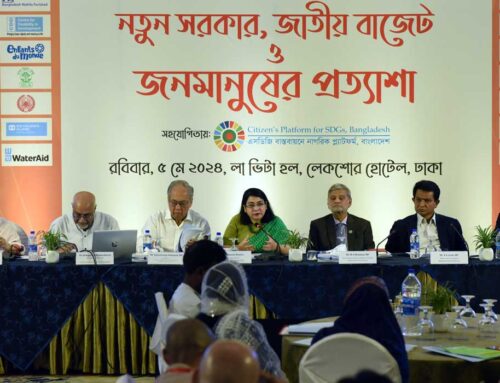The National Youth Policy of Bangladesh (2017) states that young people between the ages of 18 and 35 are considered to be part of the youth category. According to the population census of 2022, this age group makes up almost 30% of the nation’s total population of more than 50 million people. This demonstrates the significance of youth in the nation-building and socio-economic progress of the country. The COVID-19 pandemic’s negative effects have emphasised the difficulties faced by youth, including poor schooling and learning outcomes, limited employment and mental health issues. The future of a nation like Bangladesh heavily depends on the influence of youth in guiding the development process. The Conference ended with the adoption of the Youth Declaration 2022 that reflected the aspirations and opinions of Bangladeshi youth on various socio-developmental issues.
The Conference
In this regard, the Citizen’s Platform for SDGs, Bangladesh, in partnership with United Nations Development Programme (UNDP) Bangladesh and United Nations Environment Programme (UNEP) organised a day-long conference titled SDGs and Youth in Bangladesh: Present Perspectives and Future Outlook (“যুব সমাজ ও এসডিজি: আজকে দাঁড়িয়ে, আগামীর ভাবনা”) on 1 September 2022 at Krishibid Institute Bangladesh (KIB), Dhaka. During the last two years, the Citizen’s Platform has invested its time and energy in analysing the effectiveness of the public policy interventions in view of the COVID-19 pandemic. The key objectives of this Conference were to bring the Bangladeshi youth and students to a single platform, sensitise them about SDG and motivate them by assuring that their voices are heard in the country’s policymaking.
The Participants
More than 500 participants, including high-profile personnel, youth representatives from different parts of Bangladesh, youth organisers, leaders of civil platform affiliates, international development partners, and students across the nation, attended the Conference. In addition to that, the Conference also included youth representatives from the left-behind communities such as transgender, persons with disability, indigenous, women etc.

Presentation by the young students
UNDP Bangladesh and UNYSAB mobilised the youth to prepare thematic papers on the selected areas of SDGs. Students sorted out through a competitive process and presented their thoughts on respective themes in various parallel sessions of the Conference. On behalf of the Citizen’s Platform, young researchers of the Centre for Policy Dialogue (CPD) curated the papers and guided the young authors to conclude the task successfully. Additionally, Citizen’s Platform prepared a presentation based on its prior studies on the challenges faced by the youth in the development trajectory of Bangladesh, particularly in the context of COVID-19.
Inaugural Session
The chief guest of the inaugural session, Mr M A Mannan, MP, Hon’ble Minister, Ministry of Planning, Government of Bangladesh, stated that the word ‘citizen’ seems to be limited to those living in cities only. There is also a society outside of this. It is necessary to acknowledge the rights and benefits that belong to that group of people as well. The special guest of this session Mr Stefan Liller, Resident Representative, UNDP, Bangladesh, stated that the UN is trying to increase youth involvement in three areas: education, climate change, and financial empowerment.
Advocate Sultana Kamal, Core Group Member, Citizen’s Platform, chaired this session. Mr Mostofa Sarwar Farooki, eminent filmmaker, director & producer, Ms Nobonita Chowdhury, Director of Gender, Justice and Diversity Preventing Violence against Women Initiative, BRAC and Mr Fahim Mashroor, Co-founder & CEO of Bdjobs.com Ltd also addressed at the inaugural session of the Conference. The theme of the Conference was presented by Dr Debapriya Bhattacharya, the Convenor of Citizen’s Platform and Distinguished Fellow of CPD. He highlighted that the youth community is not homogenous. The highly skilled and well-organised group alone does not comprise Bangladesh’s entire youth society. There is a large number of youth who are not well-integrated into the economy and is often found to be underprivileged. Such youth are predominately made up of women and other marginalised population groups.
Parallel Session
Besides the inaugural and closing sessions, the Conference included six parallel sessions on (i) poverty and social protection, (ii) climate action (iii) peace, justice and strong institution, (iv) gender equality, (v) responsible consumption and production, (vi) decent work and economic growth. Among others, Farah Kabir, country director of ActionAid and Kabita Bose, country director of Plan International Bangladesh enounced in these parallel sessions. The fact that national changes exist but their implementation is not guaranteed, particularly at the grassroots level, was frequently brought up throughout the meetings. Participants in the open floor discussion stressed the government’s obligation under the constitution to ensure that everyone has access to information and expressed the opinion that safeguards must be maintained to ensure that underserved populations are not left behind.

Closing Session
The closing session commenced with introductory remarks from the Chair of the session, Dr Debapriya Bhattacharya. The youth declaration was presented by Ms Shammy Wadud, President of UNYSAB and Ms Mamtajul Jannat, Programme Associate of CPD, as the youth representative. The proclamation was ultimately approved by voice vote after being moved by the chair, Dr. Debapriya Bhattacharya. Ms Gwyn Lewis, United Nations Resident Coordinator graced the session as the special guest. She praised the initiatives taken by the Bangladeshi youth, remarking that the world should learn from them when it comes to engagement for a better planet. Dr Iftekharuzzaman, Core Group Member, Citizen’s Platform and Executive Director, Transparency International Bangladesh (TIB), noted that there was much to be proud of regarding Bangladesh’s accomplishments over the past 50 years. He added that the youth had led the most admirable accomplishments of the nation.
Professor Mustafizur Rahman, Core Group Member, Citizen’s Platform and Distinguished Fellow, CPD, claimed that youths’ needs and priorities have changed. Now they know how to question. These inquiries from young people raise the subject of social responsibility. Along with it, he urged the youth to invest in their own growth. Mr Asif Ibrahim, Core Group Member, Citizen’s Platform and Vice-Chairman, New Age Group and Industries, stated the challenges that youth may face while working towards issues like climate action and good governance.
Youth Declaration 2022
The declaration proclaims that when it comes to the future of a country such as Bangladesh, young people have a pivotal role to play in steering the progress of development. Studies conducted by several international organizations reveal that developing countries which make adequate investments in the education, health, and decent employment of their youth, achieve accelerated socio-economic growth and are able to eradicate poverty at a faster pace. In addition, the adverse impacts of the COVID-19 pandemic have accentuated the challenges already being faced by the youth, whose lives were negatively affected in a number of ways, including schooling and learning outcomes, employment opportunities, and mental health conditions.
In order to get the attention of politicians, the youth and the representatives made recommendations on institutional issues including gender equality, disadvantaged youth groups, education, health, and employment. The recommendations included the necessity of special initiatives for the overall development of the young people living in remote, coastal, haor and river erosion-prone areas along with other suggestions. The institutional recommendations were specifically targeted towards the policymakers urging to ensure the enfranchisement of new youth voters.
For further details please visit-
https://bdplatform4sdgs.net/sdgs-and-youth-in-bangladesh-present-perspectives-and-future-outlook/







Leave A Comment